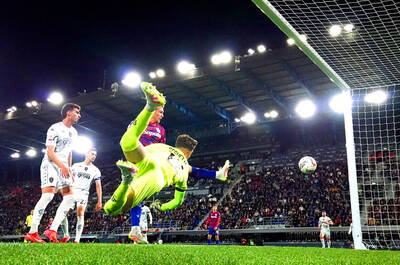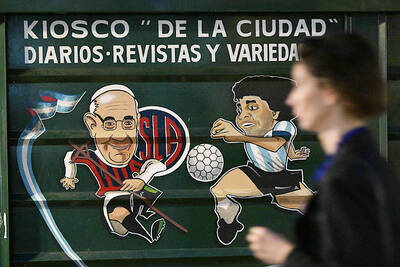Taiwan wasn’t among the winners at the Beijing Games, while historical rival China is basking in a golden glow after hosting the event and topping the medal table.
There were few positives to be drawn from this Olympiad in terms of sporting success, while a diplomatic spat over the country’s name before the Games began signaled there would be difficulties ahead.
When Taiwan’s Olympic delegation arrived at the Athlete’s Village, for instance, China’s media emphasized at every opportunity how its members felt “at home,” in an effort to score political points.
This occasionally uncomfortable situation was compounded when Chinese fans supported Taiwan’s athletes by shouting “Go China!”
Even so, a kind of Olympic truce prevailed and the chef de mission of the Taiwan delegation, Tsai Szu-chueh, said the organization of the Games was impressive, if not flawless.
“China has made great efforts over the past seven years. Its hardware development, such as sports venues, will leave a great legacy in the sports industry,” Tsai said. “But on the software front, China should have utilized the International Olympic Committee’s great talent pool and hired more international experts from the cities that hosted Olympics before. After all, it takes experience accumulated from the past to put on a great show.”
On the sporting front, Taiwan’s Games was symbolized by the failure of its vaunted baseball team, that claimed just one win and fell to relative novice China.
In the taekwondo competition, former Olympic champion Chu Mu-yen seemed fazed by the weight of a nation’s expectations and only managed bronze.
His girlfriend and Asian champion Yang Shu-chun, meanwhile, lost to Chinese rival Wu Jingyu, who went on to seal a gold medal victory.
Taekwondo head coach Hou Wei-hsing said pressure rather than a lack of ability or preparation had confounded his athletes.
“They did their best and had the confidence and ambition to win. Of course, Taiwan’s people had high hopes of them, but in the end they couldn’t achieve what they aimed for. We’ll review how we can make progress,” Hou said.
Before the Games, Tsai predicted Taiwan would exceed its Athens haul of two gold medals, a pair of silvers and a bronze, to come 31st in the standings.
Instead, the country slipped to 80th in the rankings, with four bronze medals.
“Of course the result falls short of our expectations … our hopes were dashed. Certainly we feel disappointed, but the important thing is that we note other nations have made greater progress than us,” Tsai said. “Our athletes worked hard, but competing players worked even harder and their basic training was very solid.”
Tsai echoed Hou’s words when he said training systems would be reviewed and there would be improvements for London 2012.
Many countries will be looking at China’s example when it comes to reforming training programs, said Jeff Ruffolo, a senior advisor to the Beijing organizers who has overseen four Olympics.
“The level of competition was so much higher than before and this was seen in the number of records that were broken,” Ruffolo said. “China not only exceeded at what it has traditionally done well, but also sports like archery where it has not done so well. Maybe others will emulate this.”
“John Hancock” is the Taipei Times’ correspondent for the Beijing Olympics.

Bologna on Thursday advanced past Empoli to reach their first Coppa Italia final in more than half a century. Thijs Dallinga’s 87th-minute header earned Bologna a 2-1 win and his side advanced 5-1 on aggregate. Giovanni Fabbian opened the scoring for Bologna with a header seven minutes in. Then Viktor Kovalenko equalized for Empoli in the 30th minute by turning in a rebound to finish off a counterattack. Bologna won the first leg 3-0. In the May 14 final in Rome, Bologna are to face AC Milan, who eliminated city rivals Inter 4-1 on aggregate following a 3-0 win on Wednesday. Bologna last reached the

If the Wild finally break through and win their first playoff series in a decade, Minnesota’s top line likely will be the reason. They were all over the Golden Knights through the first two games of their NHL Western Conference quarter-finals series, which was 1-1 going back to Minnesota for Game 3 today. The Wild tied the series with a 5-2 win on Tuesday. Matt Boldy had three goals and an assist in the first two games, while Kirill Kaprizov produced two goals and three assists. Joel Eriksson Ek, who centers the line, has yet to get on the scoresheet. “I think the biggest

From a commemorative jersey to a stadium in his name, Argentine soccer organizers are planning a slew of tributes to their late “Captain” Pope Francis, eulogized as the ultimate team player. Tributes to the Argentine pontiff, a lifelong lover of the game, who died on Monday at the age of 88, have been peppered with soccer metaphors in his homeland. “Francisco. What a player,” the Argentine Football Federation (AFA) said, describing the first pope from Latin America and the southern hemisphere as a generational talent who “never hogged the ball” and who showed the world “the importance of having an Argentine captain,

Noelvi Marte on Sunday had seven RBIs and hit his first career grand slam with a drive off infielder Jorge Mateo, while Austin Wynn had a career-high six RBIs as the Cincinnati Reds scored their most runs in 26 years in a 24-2 rout of the Baltimore Orioles. Marte finished with five hits, including his eighth-inning homer off Mateo. Wynn hit a three-run homer in the ninth off catcher Gary Sanchez. Cincinnati scored its most runs since a 24-12 win against the Colorado Rockies on May 19, 1999, and finished with 25 hits. Baltimore allowed its most runs since a 30-3 loss to